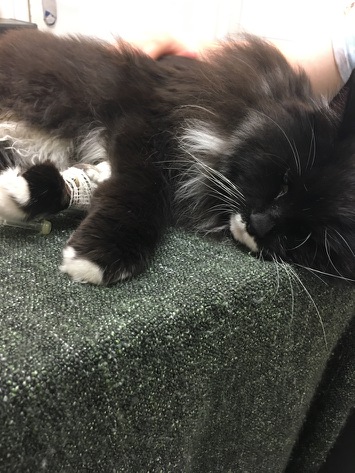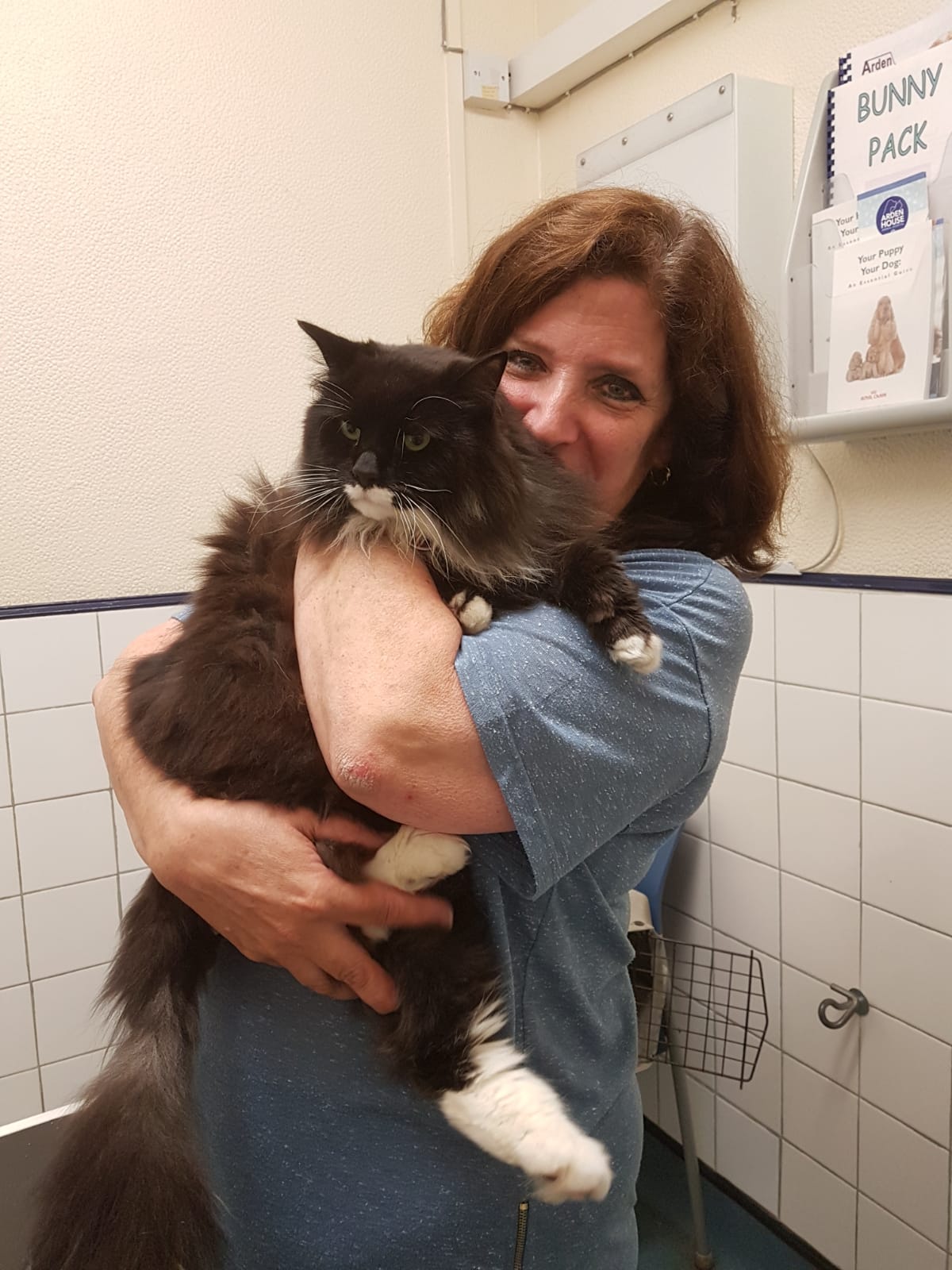
Our pet of the month from July is super Shadow, who suffers from Feline Lower Urinary Tract disease (FLUTD). He has required treatment over the last few months after a flare up of his condition meant that he was unable to pass urine properly, a situation that needed urgent veterinary attention as it can be life threatening.
A brief overview;
FLUTD is not a specific disease but rather is the term used to describe conditions that can affect the urinary bladder and/or urethra (the lower urinary tract) of cats.
Clinical signs for these disorders are all very similar so it is often difficult or impossible to determine the underlying cause without doing further investigations.
The underlying causes of FLUTD include; bladder stones, bacterial infections, urethral plugs – an accumulation of proteins, cells, crystals and debris that bind together, anatomical defects e.g stricture, and bladder tumours. However, a number of cats develop the condition without any obvious underlying cause – so called Feline Idiopathic Cystitis (FIC).
Both male and female cats can suffer from FLUTD but it is the male cat that is more susceptible to a urethral obstruction due to their urethra being longer and narrower. (The urethra is a tubular structure that runs from the bladder to the outside of the body). A blocked urethra (commonly referred to as a 'blocked bladder') is an emergency that requires immediate veterinary treatment.
- Restlessness
- Irritability or aggression
- Lethargy
- Straining to try and pass urine but unable to
- Frequent and/ or prolonged visits to the litter tray with only a small amount of urine passed (spotting)
- Blood in the urine
- Excessive licking of the genital area
- Urination in inappropriate places (outside of the litter box)
- Crying out while attempting to urinate (pain)
Shadow
It was November last year when Shadow's owner first brought Shadow in to see us after she'd noticed he was not acting himself and he’d not eaten. An examination by vet Kirstie revealed that his bladder was very large and painful and she suspected that he was unable to pass urine. As Shadow prefers to toilet outside, his owner had not been able to assess this. He was admitted for emergency treatment which involved placing a urinary catheter to allow the urine to drain out of his bladder, relieving the pressure. A blood test was taken to ensure that Shadow's kidneys had not been damaged and to check that potassium (an electrolyte) had not built up to dangerous levels. Shadow was prescribed some medication to support his bladder and after a night in hospital was feeling much better. Shadow went home and at his next check up was doing well so it was decided to continue with supportive treatment. His owner's were advised to encourage Shadow to drink more water which helps to flush the urinary tract by producing more urine. They bought a water fountain and started to mix some wet food (pouches) into his dry food. Importantly they were aware of signs to look for should there be a recurrence.
In February this year, Shadow's owner's noticed that he appeared uncomfortable and promptly brought him in to us. Vet Celia examined him and found his bladder to be painful. He was also unable to pass a free flow of urine so he was admitted to the hospital for a urinary catheter to be placed and for treatment for the pain and inflammation. Shadow required some tests to investigate the cause of his symptoms. Over the next few weeks, Shadow had an ultrasound scan and some x-rays taken. These procedures allowed the vets to look for the presence of bladder stones (uroliths), assess the structure of the bladder and urethra, and assess kidney health. They also checked for signs that could indicate a tumour to be present. Urine samples were sent to the lab and analysed for signs of infection and the appearance of significant quantities of crystals. With each of these factors ruled out, Shadow’s symptoms were attributed to Feline Idiopathic Cystitis (FIC) that lead to severe urethral spasms which was why he was unable to urinate.
This was very painful for him and it was important to keep him as comfortable as possible and carefully monitor his urination. Blood tests were run to monitor his kidney function and he required supportive intravenous fluid therapy.

Subsequently, Shadow has had to stay with us several times over the course of the last few weeks for further catheterisations, monitoring and treatment. Shadow pictured in hospital during a visit from his owner. It was important that Shadow received plenty of attention as he was feeling quite depressed, so the nurses chatted away to him to help keep his spirits up and he enjoyed some chin rubs! Shadow's owner visited with some freshly boiled fish to tempt him to eat and of course was on hand with plenty of fuss.
Throughout his time with us, Shadow has been an exemplary patient and we pleased to say that he is now doing well at home. His owners monitor him very closely to ensure that any clinical signs of recurrence are picked up on as soon as possible. Shadow takes his medication daily and his owners are continuing to encourage him to eat wet food and drink plenty of water. They are also watching his weight as being overweight is a possible risk factor of FIC, as is stress, so keeping him in a familiar home routine will be beneficial.
For his bravery and courage and his owner's perseverance and love, Shadow is our much deserved pet of the month.



